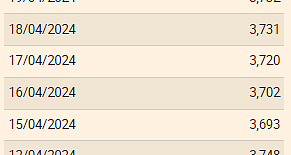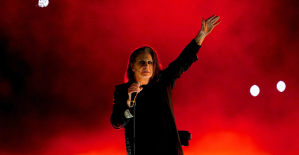Thus, without any kind of subtlety, metaphors or any kind of figurative language, begins 'Dau', one of the greatest epics in the history of European cinema (if not worldwide) that makes a meticulous and critical analysis (as it could not be otherwise) of one of the most bloodthirsty regimes in the history of mankind; the sovietic Union.
And that, therefore, requires a meticulous analysis of the catechism written by Marx and Engels a couple of centuries ago. But let's go to the beginning, what is Dau?
From a biopic to a study of Soviet repression
The chieftain, this will be understood later, of this project Ilya Khrzhanovskiy describes 'Dau' as "the first film about isolation shot in isolation by isolated people." What at first was going to be a biopic of Lev Landau, a scientist who won the Nobel Prize for his contributions to physics, little by little became something much bigger and lunatic that tried to make a study of Soviet repression with the central axis of this physicist who worked for the state; or, rather, the single party.
Although this isolation in 2020 would take on another meaning, it is understood as isolation to the entire set of Soviet republics that until the fall of the Berlin Wall were years and years without any contact with Western culture.
When you say lunatic it is because the director came up with the mindless but brilliant idea of building a giant set where to recreate the laboratory where this scientist would work and, not content with that, lock up a group of actors there (many of them non-professionals) to recreate what was the USSR between the 30s and 60s.
Everything was carefully studied and everyone followed the orders of a new dictator, who in this case was the Machiavellian director of the film (s). The result, after two years of recordings, translates into more than 700 hours of material (according to its official website) compressed into fifteen films and five series.
Marked by the rules of the Soviet Union, the actors lived in that time capsule for a period of two years (we imagine they would leave and enter at the convenience of the narrative) under the rules and restrictions of freedom typical of an authoritarian regime.
So far the first eight parts of the project have been released. 'Dau: Natasha' and 'Dau: Degeneration' were seen last year at the Berlin festival and now within the framework of D'A in Barcelona, they can be seen at Filmin; the rest are available on the official website of Dau paying a symbolic rent, since the pandemic prevented their passage through festivals last year. It seems that the seven titles that are to be seen will have space in some contest throughout this year or already in 2022.
Where to start with 'DAU'
'Dau. Natasha 'is a secondary work when it comes to studying Dau's life, but it is a great film that makes us understand the terror that could be experienced by the impositions of the party. It tells the story of Natasha, the waitress at the secret laboratory canteen, and her relationship with her employees.
Everything will change when she has sex with a visiting scientist and her party accuses her of treason. Although the critique of communism as an ideology is not so latent in this piece, 'Dau. Natasha 'helps us to see the dimension and degree of paranoia and terror with which one could come to live in a society where every movement could be considered treason, any small detail (not carrying a passport on him) was a reason for arrest and in consequences torture or forced labor that, on many occasions, would lead to death.
'Dau. Natasha 'is a film drenched in alcohol, an element used to show the loss of control over oneself, since its protagonist tends to give vodka after his work days and it will be in this context that he begins to interact with the senior managers from the lab and having sex with this guest scientist.
In an explicit scene, with not simulated and quite extensive penetration, Ilya Khrzhanovskiy executes an unpleasant exercise in voyeurism that explains very well the constant collectivity of a regime where privacy and individual freedom were unthinkable and punished.
This form of false subtlety (abrupt and unpleasant images loaded with meaning) is the general line on which 'DAU' is built, in the extreme and absolute dehumanization of all the characters that translates into the closed space where its actors coexisted that it recreates very well a nation that could not be escaped and to understand that from a theoretical point of view there are the six hours of 'Dau: Degeneration'.

 The Euribor today remains at 3.734%
The Euribor today remains at 3.734% Germany: the trial of an AfD leader, accused of chanting a Nazi slogan, resumes this Tuesday
Germany: the trial of an AfD leader, accused of chanting a Nazi slogan, resumes this Tuesday New York: at Columbia University, the anti-Semitic drift of pro-Palestinian demonstrations
New York: at Columbia University, the anti-Semitic drift of pro-Palestinian demonstrations What is Akila, the mission in which the Charles de Gaulle is participating under NATO command?
What is Akila, the mission in which the Charles de Gaulle is participating under NATO command? What High Blood Pressure Does to Your Body (And Why It Should Be Treated)
What High Blood Pressure Does to Your Body (And Why It Should Be Treated) Vaccination in France has progressed in 2023, rejoices Public Health France
Vaccination in France has progressed in 2023, rejoices Public Health France Food additives suspected of promoting cardiovascular diseases
Food additives suspected of promoting cardiovascular diseases “Even morphine doesn’t work”: Léane, 17, victim of the adverse effects of an antibiotic
“Even morphine doesn’t work”: Léane, 17, victim of the adverse effects of an antibiotic MEPs validate reform of EU budgetary rules
MEPs validate reform of EU budgetary rules “Public Transport Paris 2024”, the application for Olympic Games spectators, is available
“Public Transport Paris 2024”, the application for Olympic Games spectators, is available Spotify goes green in the first quarter and sees its number of paying subscribers increase
Spotify goes green in the first quarter and sees its number of paying subscribers increase Xavier Niel finalizes the sale of his shares in the Le Monde group to an independent fund
Xavier Niel finalizes the sale of his shares in the Le Monde group to an independent fund Owner of Blondie and Shakira catalogs in favor of $1.5 billion offer
Owner of Blondie and Shakira catalogs in favor of $1.5 billion offer Cher et Ozzy Osbourne rejoignent le Rock and Roll Hall of Fame
Cher et Ozzy Osbourne rejoignent le Rock and Roll Hall of Fame Three months before the Olympic Games, festivals and concert halls fear paying the price
Three months before the Olympic Games, festivals and concert halls fear paying the price With Brigitte Macron, Aya Nakamura sows new clues about her participation in the Olympics
With Brigitte Macron, Aya Nakamura sows new clues about her participation in the Olympics Skoda Kodiaq 2024: a 'beast' plug-in hybrid SUV
Skoda Kodiaq 2024: a 'beast' plug-in hybrid SUV Tesla launches a new Model Y with 600 km of autonomy at a "more accessible price"
Tesla launches a new Model Y with 600 km of autonomy at a "more accessible price" The 10 best-selling cars in March 2024 in Spain: sales fall due to Easter
The 10 best-selling cars in March 2024 in Spain: sales fall due to Easter A private jet company buys more than 100 flying cars
A private jet company buys more than 100 flying cars This is how housing prices have changed in Spain in the last decade
This is how housing prices have changed in Spain in the last decade The home mortgage firm drops 10% in January and interest soars to 3.46%
The home mortgage firm drops 10% in January and interest soars to 3.46% The jewel of the Rocío de Nagüeles urbanization: a dream villa in Marbella
The jewel of the Rocío de Nagüeles urbanization: a dream villa in Marbella Rental prices grow by 7.3% in February: where does it go up and where does it go down?
Rental prices grow by 7.3% in February: where does it go up and where does it go down? Europeans: “All those who claim that we don’t need Europe are liars”, criticizes Bayrou
Europeans: “All those who claim that we don’t need Europe are liars”, criticizes Bayrou With the promise of a “real burst of authority”, Gabriel Attal provokes the ire of the opposition
With the promise of a “real burst of authority”, Gabriel Attal provokes the ire of the opposition Europeans: the schedule of debates to follow between now and June 9
Europeans: the schedule of debates to follow between now and June 9 Europeans: “In France, there is a left and there is a right,” assures Bellamy
Europeans: “In France, there is a left and there is a right,” assures Bellamy These French cities that will boycott the World Cup in Qatar
These French cities that will boycott the World Cup in Qatar Serie A: Bologna surprises AS Rome in the race for the C1
Serie A: Bologna surprises AS Rome in the race for the C1 Serie A: Marcus Thuram king of Italy, end of the debate for the position of number 9 with the Blues?
Serie A: Marcus Thuram king of Italy, end of the debate for the position of number 9 with the Blues? Milan AC-Inter Milan: Thuram and Pavard impeccable, Hernandez helpless… The tops and flops of the derby
Milan AC-Inter Milan: Thuram and Pavard impeccable, Hernandez helpless… The tops and flops of the derby Ligue 2: Auxerre leader, Bordeaux in crisis, play-offs... 5 questions about an exciting end of the season
Ligue 2: Auxerre leader, Bordeaux in crisis, play-offs... 5 questions about an exciting end of the season


















